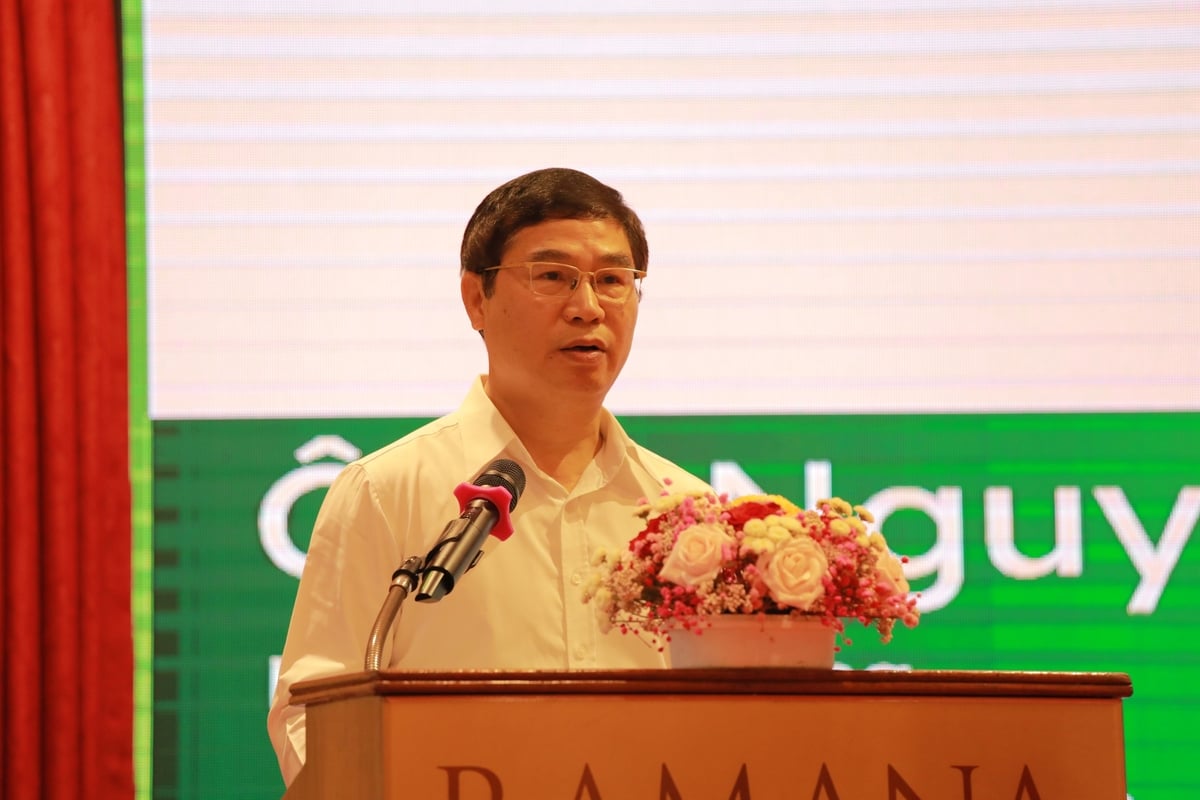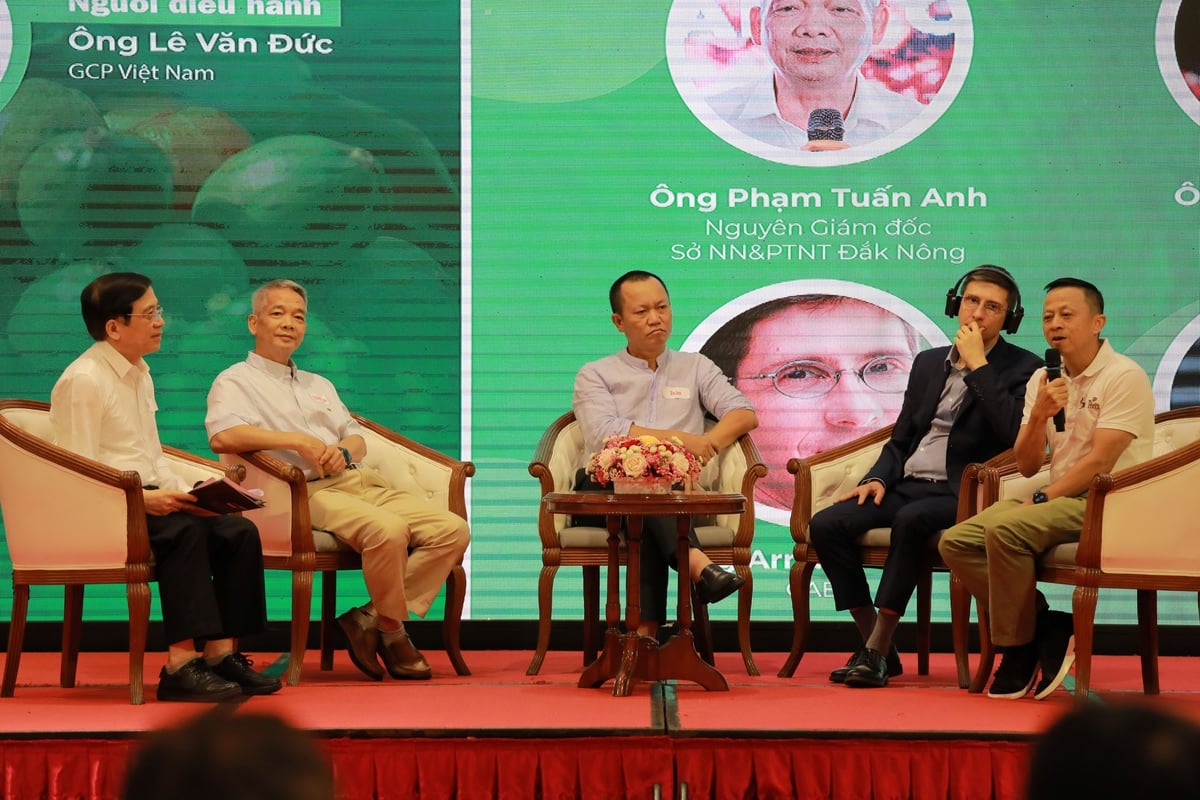December 30, 2025 | 16:59 GMT +7
December 30, 2025 | 16:59 GMT +7
Hotline: 0913.378.918
December 30, 2025 | 16:59 GMT +7
Hotline: 0913.378.918
Having been involved with coffee cultivation for over 20 years, Mr. Nguyen Van Luc from Nam Nung commune (Dak Nong) is witnessing profound changes in his coffee farm.
According to Mr. Luc, before 2022, his coffee farming, like most farmers’, involved spraying herbicides, applying fertilizer multiple times, and focusing on yield. However, the more they did, the more the soil became degraded, the plants weakened, productivity did not improve, and profits steadily declined. The turning point came when he was invited to participate in a training course on environmentally friendly weed management, part of the activities under the “Collective Action Initiative for Responsible Use of Agricultural Inputs in the coffee sector” (CAI initiative) launched by the Global Coffee Platform (GCP).

Mr. Nguyen Van Luc tends to his family's coffee farm. Photo: GCP.
“At first, I thought it was just theory. But after a few trial crops, I completely changed my mind. Keeping the weeds helps retain soil moisture, earthworms return, watering is reduced, fertilizer use drops significantly, the plants are healthier, and yield increases from 4 to 6 tons, with fertilizer costs cut by nearly 40%,” Mr. Luc Luc shared.
Mr. Luc’s story is not unique. Over the 5-year implementation period from 2020 to 2025 across five Central Highlands provinces, the initiative has accompanied thousands of farmers, transforming old farming habits into a responsible agricultural model, while also paving the way for Vietnamese coffee to approach global standards.
At the closing ceremony of the Collective Action Initiative for Responsible Use of Agricultural Inputs in the coffee sector recently held in Ho Chi Minh City, Mr. Nguyen Quy Duong, Deputy Director of the Plant Production and Protection Department, emphasized that the CAI initiative was born at a time when the coffee sector faced challenges related to quality and the risk of being excluded from major markets due to pesticide residues.

Mr. Nguyen Quy Duong, Deputy Director of the Plant Production and Protection Department, speaks at the program. Photo: Ha Duyen.
According to Mr. Duong, after 5 years, the initiative has proven that mindset change is the foundation for sustainable development. One of the most important achievements is the significant reduction of glyphosate residues - a substance strictly regulated in the EU. The percentage of coffee containing glyphosate residues dropped from 56% in 2020 to only 1.2% in 2023, helping Vietnam meet stringent export standards.
Not limited to a technical perspective, the initiative also created a network connecting businesses, farmers, regulatory agencies, and international organizations, forming the foundation for an effective public-private partnership model. “We recognize the project’s ripple effects not only in the pilot areas but also expanding to other localities through training, communication, and a network of local technicians. This is an initial step to scale up green and circular production,” Mr. Duong said.

The delegates discuss solutions to promote sustainable production in the coffee sector. Photo: Ha Duyen.
From a broader perspective, Dr. Le Quoc Doanh, former Deputy Minister of the Ministry of Agriculture and Rural Development, highly appreciates the results achieved by the GCP initiative and regards it as an important step in the coffee sector’s restructuring journey. “Vietnamese coffee has come a long way, from a few tens of thousands of hectares before liberation to over 700,000 hectares in recent years, with export turnover reaching nearly 4.8 billion USD in the first five months of 2025. But to maintain and enhance our position, we must shift from volume-driven production to responsible production,” Dr. Le Quoc Doanh said.
Mr. Doanh emphasized that sustainable production is not only about individual farms but encompasses the entire value chain, from inputs, cultivation, processing to traceability. “We cannot continue production where everyone acts independently, using pesticides indiscriminately and fertilizers without control. That is a worn-out approach that does not lead to sustainability,” Dr. Le Quoc Doanh stressed.
According to him, the combination of farmers, businesses, scientists, and government is the key formula to create change. He cited previous replanting programs, showing that when there is a transparent, simple, and easy-to-apply technical package, farmers will change. And this is clearly demonstrated by the results of the GCP initiative.
“If we continue to maintain the spirit of cooperation and responsibility as we do now, Vietnamese coffee will not only retain its leading export position but can also rise to become the world leader in quality and sustainability,” Dr. Le Quoc Doanh expressed.
Translated by Phuong Linh
/2025/12/29/0829-2-000508_274.jpg)
(VAN) Hai Phong is tightening management, with 100% of fishing vessels licensed and equipped with vessel monitoring systems, joining the national effort to lift the EC's 'yellow card.'
/2025/12/27/2744-1-121716_241.jpg)
(VAN) The Viet Nam Environment Protection Fund is the national environment protection fund and a state financial institution under the Ministry of Agriculture and Environment.
/2025/12/27/2015-2-111213_813.jpg)
(VAN) In efforts to realize the goal of Net Zero emissions, reducing urban emissions is regarded as a key solution.

(VAN) Deputy Prime Minister Tran Hong Ha requested to design the EPR mechanism toward a circular economy that is transparent, feasible, and non-administrative and aligned with actual recycling capacity.

(VAN) On December 24, Deputy Prime Minister Tran Hong Ha chaired a meeting about approving greenhouse gas emission quotas for 2025 - 2026 period.

(VAN) As Viet Nam enters a new era, the national agricultural sector must proactively adapt to global trends to transform current challenges into strategic development opportunities.
/2025/12/18/5046-3-154320_307.jpg)
(VAN) Granting planting area codes is a solution that helps Lao Cai manage forests effectively while also laying a data foundation to support the development of the carbon credit market in the future.